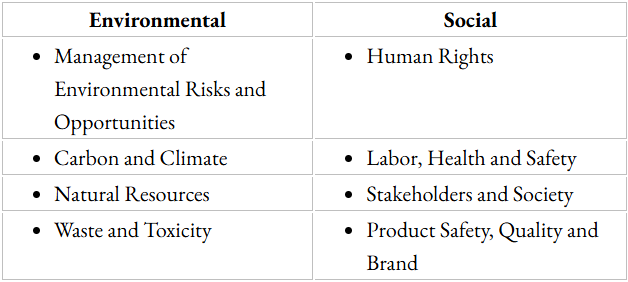ISS has announced that it will be updating its Environmental & Social Disclosure QualityScore (ESQS) scoring methodology. ESQS covers approximately 8,000 issuers across 25 industry groups in the Americas, Europe and Asia/Pacific region. ESQS and the updates are further discussed in this post.
ESQS is a subscription-based, data-driven scoring and screening solution used by many institutional investors as a stewardship input for measuring and identifying areas of environmental and social risk. ESQS scores are based on company disclosures, including mainstream filings, publicly available company policies and information on company websites.
The scores are intended to provide an indication of the relative quality of a company’s disclosures and transparency compared with industry peers. Many covered companies take the ESQS scoring methodology into account in their ESG-related disclosure decisions.
ESQS scores are broken down into four categories under each of two pillars (each category is further broken down into sub-categories):
 In addition to providing decile-based relative pillar and category risk scores, ESQS profiles provide a summary of key disclosures and disclosure omissions, an overview of disclosure and transparency risks and detail the factors used to determine the company’s scores.
In addition to providing decile-based relative pillar and category risk scores, ESQS profiles provide a summary of key disclosures and disclosure omissions, an overview of disclosure and transparency risks and detail the factors used to determine the company’s scores.
ESQS analyzes more than 340 factors across the “E” and “S” pillars. The specific factors analyzed for each company vary by industry but include approximately 240 factors. Data collection is continuous. Each company is profiled annually according to its fiscal year-end.
As part of ISS’ periodic methodology review, the ESQS dataset is being revised to remain aligned with sustainability reporting and disclosure expectations of institutional investors. As part of the methodology update, ISS will be adding 35 factors. Among other things, this will include more detailed data points regarding Scope 3 greenhouse gas emissions, business ethics and health and safety.
New answer options will be added for approximately 20 factors to better account for company-specific assessments. Nine factors will be removed entirely and an additional two factors will be removed from some industries due to decreasing relevance.
As a comparison, in the September 2024 update, the ESQS dataset was reoriented towards the European Sustainability Reporting Standards used for reporting under the EU Corporate Sustainability Reporting Directive. In that update, 26 new factors were introduced, including relating to workforce management, circular economy and water resources. Forty-five data points were retired.
Covered companies are able to review, verify, correct and update their data online through the ISS platform as part of routine data verification. Companies within the ESQS coverage universe will have an opportunity to verify the new data in late September. Prior to that time, ISS will provide more granular details on the nature and scope of the planned ESQS enhancements.